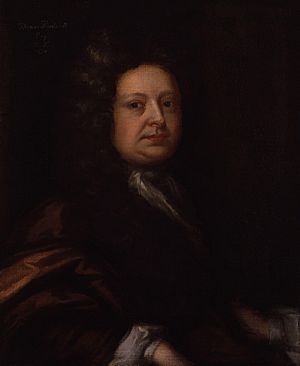Thomas Shadwell facts for kids
Quick facts for kids
Thomas Shadwell
|
|
|---|---|
 |
|
| Poet Laureate of the United Kingdom | |
| In office 9 March 1689 – 19 or 20 November 1692 |
|
| Monarch | William III and Mary II |
| Preceded by | John Dryden |
| Succeeded by | Nahum Tate |
| Personal details | |
| Born | c. 1642 Weeting or Lynford, Norfolk, England |
| Died | 19 November 1692 (aged approx. 49–50) London, England |
| Spouse | Anne Shadwell |
| Children | 4, including Charles |
| Alma mater | Gonville and Caius College, Cambridge |
| Occupation | Poet, playwright |
| Awards | Poet laureate |
Thomas Shadwell (around 1642 – 19 November 1692) was an English poet and writer of plays. He became the official Poet Laureate in 1689. This important job meant he was the poet for the King and Queen.
Contents
About Thomas Shadwell's Life
Thomas Shadwell was born in Norfolk, England, either at Bromehill Farm or Santon House. He went to Bury St Edmunds School and then to Gonville and Caius College, Cambridge in 1656. He left college without a degree and later joined a law school called the Middle Temple.
Becoming Poet Laureate
In 1688, there was a big change in England called the Glorious Revolution. The Whig political party gained power. Because of this, Thomas Shadwell took over the job of Poet Laureate from another famous writer, John Dryden. He also became the royal historian.
Family and Legacy
Thomas Shadwell was married to an actress named Anne Shadwell. She acted in some of his plays. They had four children. One of their sons, Charles Shadwell, also became a playwright. Another son, John Shadwell, became a doctor who treated important people like Queen Anne and George I.
Thomas Shadwell passed away in Chelsea on 19 November 1692. He was buried in Chelsea Old Church. Sadly, his tomb was destroyed during a war. However, there is a special memorial for him in Poets' Corner at Westminster Abbey. This memorial includes a bust (a sculpture of his head and shoulders) made by Francis Bird.
Thomas Shadwell's Plays and Writings
Thomas Shadwell started writing plays in 1668. His first play was a comedy called The Sullen Lovers. It was based on a play by a French writer named Molière. Shadwell was inspired by Ben Jonson, another famous English playwright, who wrote "comedies of humours." These plays focused on characters with strong, often funny, personalities.
Famous Plays
Two of Shadwell's most well-known plays are Epsom Wells (1672) and The Squire of Alsatia (1688). The Squire of Alsatia is set in a part of London called Whitefriars, also known as "Alsatia." This area was a safe place for people trying to avoid being arrested. The play shows the adventures of a young man who gets involved with tricky characters there. The dialogue in the play uses a lot of the local slang from that time.
For about 14 years, Shadwell wrote a new play almost every year. His plays often showed a dislike for fake people and a strong sense of right and wrong. They also give us a good look at what life was like in England during his time.
Rivalry with John Dryden
Thomas Shadwell is often remembered because of his arguments with John Dryden. Dryden was a very famous poet who wrote a harsh poem about Shadwell called Mac Flecknoe (1682). In this poem, Dryden made fun of Shadwell, calling him the "last great prophet of tautology" (meaning someone who repeats themselves a lot).
Even though they had their differences, Dryden had actually written a prologue (an introduction) for one of Shadwell's plays before. But when Dryden started supporting the King's party, Shadwell became a strong supporter of the Protestants. Shadwell then wrote a mean attack on Dryden. Dryden quickly wrote Mac Flecknoe in response. Later, Dryden also wrote more satirical (mocking) descriptions of Shadwell in another poem.
However, Dryden's poem Mac Flecknoe left a lasting impression. It made Shadwell famous, but not always in a good way. Despite this, when the Whig party won power in 1688, Shadwell took over Dryden's jobs as Poet Laureate and royal historian.
Thomas Shadwell's son, Charles Shadwell, also became a playwright. A part of his play, The Stockjobbers, was even used in a modern play called Serious Money (1987).
Thomas Shadwell's Poems
Dear Pretty Youth
|
|
|
Dear pretty youth, unveil your eyes, |
|
Love in their little veins inspires
|
|
|
Love in their little veins inspires |
|
Nymphs and Shepherds
|
|
|
Nymphs and shepherds, come away. |
|
See also
 In Spanish: Thomas Shadwell para niños
In Spanish: Thomas Shadwell para niños
 | James Van Der Zee |
 | Alma Thomas |
 | Ellis Wilson |
 | Margaret Taylor-Burroughs |

